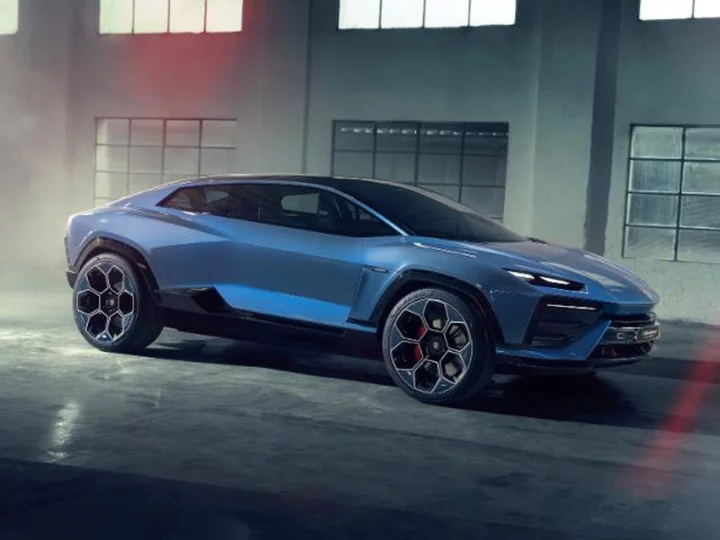The Lamborghini Lanzador is only a concept car for now, but the Italian supercar maker says it offers a preview of the brand's very first fully electric model which will go into production in 2028.
It's not the sort of low-slung two-seat supercar for which Lamborghini is famous. While its overall low-profile shape is similar to that of a Lamborghini sports car, the 1,300 horsepower Lanzador rides higher off the ground so it can drive in rough terrain.
With no space needed for a gas engine — in a gas-powered Lamborghini sports car, it would be behind the seats — the Lanzador has small back seats. They can be moved or folded away opening more space for luggage under the car's big tailgate. Under the hood, there's even more space for storage.
The concept vehicle will be developed into only the fourth model line for the tightly focused performance brand, joining its two traditional sports car models and an SUV.
Lamborghini has been paving the way for this sort of new model for a long time. Products like the Urus SUV and the Huracán Stererrato, an off-road-capable sports car, have gotten customers used to the idea that Lamborghinis don't always have to be low-slung two-seaters.
A link between luxe sports car and trusty SUV
The new electric model will provide the link between Lamborghini's radical sports cars and its more practical SUV.
"For us, the fourth model is the absolutely logical extension of the existing portfolio, the perfect link between Urus and our super sports cars," Lamborghini chief executive Stephan Winkelmann said in a statement.
And there's a reason Lamborghini is introducing its first all-electric car as a new model line, rather than as a replacement for one of its current models.
Winkelmann has previously said that he feels electric vehicle technology isn't yet ready for use in traditional two-seat high-performance sports cars. The batteries needed to provide the power and driving range an owner might want would be too heavy and bulky to allow the sort of fast cornering that makes a Lamborghini sports car so thrilling.
Other automakers, like Rimac and Automobili Pininfarina (which uses Rimac technology), already sell electric two-seat supercars costing millions of dollars. But even Mate Rimac, founder of Rimac, has admitted battery-powered cars still have limitations compared to gas-powered supercars.
Instead, Lamborghini will offer two-seat plug-in hybrid supercars that combine gasoline engines with electric motors for now, reducing the need for bulky batteries.
The four-seat Lanzador, by contrast, has the space to house those big batteries. Porsche — which like Lamborghini is part of the Volkswagen Group — took a similar approach with its first EV. The Porsche Taycan EV has four seats and, unlike the Lanzador, four doors. Similarly, the Taycan's extra length allows space to fit large battery packs to provide strong performance.
Lamborghini boasts that the Lanzador could comfortably be driven every day, like the gas-powered Urus SUV that currently accounts for half of all Lamborghinis sold.
The driver and front passenger seats are situated low in the cabin, to mimic the feel of a sports car. There's no central touchscreen of the sort most modern cars have. Passengers have their own displays, though, and the driver sits in front of a digital screen that shows various types of information.
One electric motor powers the front wheels and another the back, providing all-wheel drive. The Lanzador also has numerous active aerodynamic features, fins and vents that can flip open and closed as needed. They can either allow for smooth, efficient airflow to maximize driving range or provide downforce for the strongest road-holding for cornering and acceleration.
Lamborghini has committed to selling only "electrified vehicles," meaning either plug-in hybrid or fully electric, by the end of 2024. The company has not promised to entirely phase out internal combustion engines by any specific year, though.

